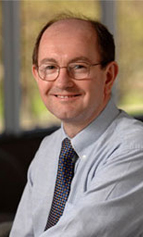 Dr. John O'Keefe
Dr. John O'Keefe
In May, I attended the funeral of Dr. Bruce Squires, former editor-in-chief of CMAJ. While sad that Dr. Squires had passed away, I was heartened to hear the fond words of remembrance spoken by those who had known him over the years. Many considered Dr. Squires a great teacher, with a wonderful sense of humour, who delighted in sharing his knowledge with others. I can echo these sentiments, as I also benefited greatly from his insights and generosity, especially in my early years as JCDA editor-in-chief.
Dr. Squires conveyed many helpful tips about the role of an editor-inchief, invited me to become a member of the World Association of Medical Editors, conducted an editing workshop on behalf of JCDA, and always offered me advice about any dilemmas I encountered. In short, Dr. Squires ranks among one of the most influential mentors of my career. I feel extremely lucky to have been shaped by several colleagues and friends who took an interest in helping me along my career path.
The importance of mentorship in shaping young dentists was a recurring theme during lively discussions at a forum convened by CDA titled "Putting Professionalism on the Agenda." One of the panellists, Dr. Marcel Van Woensel, writes in this edition of JCDA, just as he articulated at the forum, that a sense of community is essential for dentists and the profession as a whole. Among other community-building initiatives, he views mentorship programs as effective mechanisms to prevent new dental graduates from feeling isolated.
Dr. Mark McCullough, another forum panellist, spoke eloquently about the competitiveness and pressures facing the newest entrants to our profession. This competitive environment begins when applying to dental chools, which then leads to pressures to excel and succeed. After incurring high levels of debt, newly graduated dentists must pay off this debt and learn how to be more efficient in practice while displaying to the world that they are "successful."
These 2 presentations resonated strongly with me and led me to reflect upon my own experiences as a young graduate. I have always felt that the first office a dentist works in can have a huge influence on the direction of one's career. Looking back, I am grateful that my first principal took a genuine interest in my development and was always available to guide and support me as I launched my clinical career.
Dentistry can be a lonely pursuit unless we take actions, individually and collectively, to come together for mutual aid and guidance. Historically, our profession has been built through strong institutions fostering a professional culture that could be viewed by some outsiders as homogenous and rigid. The profession's central message to the public was that our members are competent, caring and trustworthy
Increasingly, there are challenges to our profession's cohesive culture. Many CE courses focus on topics such as business optimization and suggest that we differentiate ourselves from fellow dentists. Especially in larger centres, it is tempting to view others in the profession as competitors rather than colleagues. Informal social networks mediated by modern technologies are also challenging the attractiveness of formal organizations to younger dentists.
In such a dynamic environment, mentoring and community-building take on added urgency for our professional organizations. I am aware of a number of existing formal mentorship programs, involving partnerships between provincial dental associations and dental schools, which could serve as models to be emulated elsewhere in Canada. I believe that all forms of mentoring, from the informal advice of colleagues or principals to formalized programs, can encourage a more collegial culture in our profession for the future.
